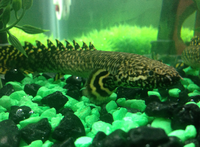Difference between revisions of "Polypterus ornatipinnis"
From The Aquarium Wiki
m |
|||
| Line 36: | Line 36: | ||
== Origin == | == Origin == | ||
| − | :Found | + | :Found in Lake Tanganyika and the Congo River basin in Central and East Africa. |
== Sexing == | == Sexing == | ||
Latest revision as of 16:10, 10 September 2019
Ornate Bichir
Polypterus ornatipinnis
908 Litres (240 US G.)
50.8-61cm (20-24 ")
Freshwater
7.0 - 8.0
25 -27 °C (77-80.6°F)
10-18 °d
1:1 M:F
5-15 years
Family
Polypteridae
Contents
Origin[edit]
- Found in Lake Tanganyika and the Congo River basin in Central and East Africa.
Sexing[edit]
- Males have a larger anal fin than females.
Tank compatibility[edit]
- A large robust but not aggressive fish that will eat fish smaller than itself. Can be kept in pairs but hiding places must be provided as they will become aggressive towards each other otherwise. Do not keep with Labeo chrysophekadion or other Labeo species as these can harass the Bichir as the occupy similar areas of the tank.
Diet[edit]
- Will accept most meaty foods including earthworms, prawns, mussels, whitebait, cockles as well as trout and catfish pellets.
Feeding regime[edit]
- These fish are not overly active so only need to be fed 2 or 3 times a week.
Environment specifics[edit]
- Require a spacious tank with hiding places in stable rocks and bogwood. Will tear apart and pull up live plants. Do not keep with sharp objects as they can damage themselves, large pieces of bogwood and sturdy silk plants are best. They must have access to breath from the surface and a sturdy secure lid is a must.
Behaviour[edit]
- A reasonably peaceful large fish that is not overly active, can be aggressive to its own species if there's not enough space to hide.
Identification[edit]
- An attractive prehistoric elongated fish, almost snake-like in appearance, with large paddle-like pectoral fins. They have a striking reticulated black and yellow patternation that extends into the fins.
Pictures[edit]
Videos[edit]
External links[edit]
- Fishbase (Mirrors:
 )
)
- Practical Fishkeeping - article
- Polypterus.info
